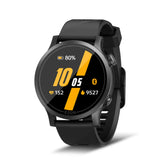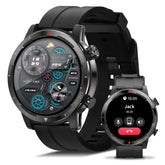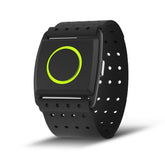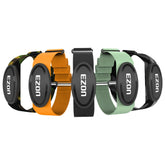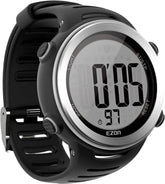Swimming Sensations: Improve Your Stroke and Endurance in the Pool
Swimming is a full-body workout that boosts cardiovascular health, builds endurance, and tones muscles—when done with proper technique. Whether you’re a beginner struggling with breathing or a competitive swimmer chasing faster times, this swimming guide dives into stroke improvement techniques, pool training drills, and how a waterproof sports watch can transform your lap tracking and performance.
1. Master the Basics: Core Stroke Techniques
A. Freestyle (Front Crawl): The Most Efficient Stroke
- Body Position: Lie flat, hips high to reduce drag—imagine a straight line from head to heels.
- Arm Recovery: Exit thumb-first, swing arm straight, and enter the water at shoulder width.
- Breathing Rhythm: Bilateral breathing (every 3 strokes) for balance; turn head sideways, not up, to avoid neck strain.
B. Breaststroke: Power and Precision
- Kick Technique: Bend knees outward, kick in a “frog” motion—focus on wide, slow kicks for propulsion.
- Arm Pull: Press water backward in a circular motion, connecting the pull to your kick timing (pull → kick → glide).
C. Backstroke: Relaxation and Rotation
- Body Rotation: Twist hips to drive arm recovery; keep shoulders relaxed to avoid shoulder strain.
- Breathing: Inhale/exhale naturally; gaze at the ceiling to maintain a straight body line.
2. Pool Training Drills for Endurance and Speed
A. Technique Drills (2–3x/week)
- Catch-Up Drill (Freestyle): Pause with hands together after each stroke to emphasize the “catch” phase of the pull.
- Single-Leg Flutter Kick: 2x25m with one leg, holding the wall—improves leg strength and balance.
- Paddle Pulls: Wear hand paddles to build upper-body power; remove them for a noticeable speed boost afterward.
B. Endurance Sets (1–2x/week)
- Continuous Swimming: 20–30 minutes of easy freestyle at 70% max effort to build aerobic base.
- Pyramid Sets: 50m → 100m → 150m → 100m → 50m with 10-second rest—gradually increase and decrease distance to improve lactate tolerance.
C. Speed Work (1x/week)
- Sprint Intervals: 8x25m at 90% effort, 20-second rest—focus on explosive starts and strong finishes.
- Negative Splits: Swim the second half of each 100m faster than the first to practice pacing.
3. The Role of a Waterproof Sports Watch in Lap Tracking
A. Automatic Lap Tracking
- No Manual Input: The watch detects flip turns and counts laps accurately, even in busy lanes (e.g., EZON Sports Watch auto-records distance, pace per lap, and stroke count).
- Real-Time Data: See average pace, total distance, and calorie burn on the display mid-swim.
B. Heart Rate Monitoring
- Stay in Target Zones: Track heart rate to ensure you’re in Zone 2 (60–70% MHR) for endurance or Zone 4 (80–90% MHR) for sprints.
- Post-Swim Analysis: Sync to apps like Strava to review stroke rate, efficiency, and progress over time.
C. Durability and Design
- Water Resistance: 5ATM–10ATM rating (50–100 meters) to withstand pool chemicals and open-water dives.
- Comfortable Fit: Lightweight, silicone straps that stay secure during fast laps.
4. Common Mistakes to Avoid
A. Overgliding in Freestyle
- Problem: Excessive gliding slows rhythm and reduces stroke efficiency.
- Fix: Keep strokes rhythmic; aim for 50–60 strokes per minute (SPM) for freestyle.
B. Ignoring Core Strength
- Problem: Weak core leads to poor body position and increased drag.
- Fix: Add planks, Russian twists, and flutter kicks on dry land 2x/week.
C. Overtraining Without Recovery
- Problem: Swimming hard every day leads to fatigue and plateaus.
- Fix: Include 1–2 easy recovery days with drills or gentle laps; use a waterproof sports watch to monitor resting heart rate for signs of overtraining.
5. Recovery and Nutrition for Swimmers
A. Post-Swim Recovery
- Stretch: Focus on shoulders, lats, and hips to improve mobility—try doorway chest stretches and hip circles.
- Foam Rolling: Release tightness in the upper back and quads to prevent muscle imbalances.
B. Fuel for Performance
- Pre-Swim: 30–60g carbs 1 hour before (oatmeal, banana) for sustained energy.
- Post-Swim: 20–30g protein + 50g carbs within 60 minutes (Greek yogurt + granola) to aid muscle repair.
- Hydration: Drink electrolyte-rich fluids post-swim to replace sodium lost through sweat.
6. Gear Up for Success
A. Essential Swim Gear
- Goggles: Anti-fog, mirrored lenses (e.g., Speedo Vanquisher) for clear vision and UV protection.
- Swim Cap: Silicone cap to reduce drag and keep hair dry; latex caps for better grip on wet hair.
- Training Fins: Short blades for improving kick technique without overworking legs.
B. Choose the Right Waterproof Watch
- EZON GPS Series: Features lap tracking, heart rate monitoring, and 10ATM water resistance—perfect for pool and open-water swims.
- Battery Life: 20+ hours in GPS mode for long training sessions without frequent charging.
Dive In and Swim Strong
With the right stroke improvement focus, strategic pool training drills, and a reliable waterproof sports watch for lap tracking, you’ll transform your swimming from a struggle to a sensation. Remember, progress comes from consistent, mindful practice—whether you’re aiming to swim a mile without stopping or shave seconds off your race time.
So grab your goggles, set your watch, and hit the pool with purpose. Every lap is a step toward becoming a stronger, more efficient swimmer. Let the water be your gym, your therapy, and your playground—swim with intention, and watch your endurance and technique soar.
